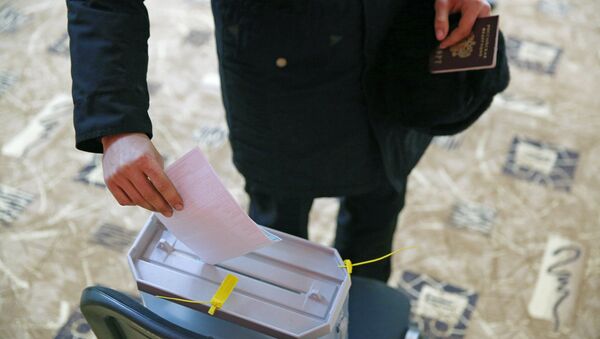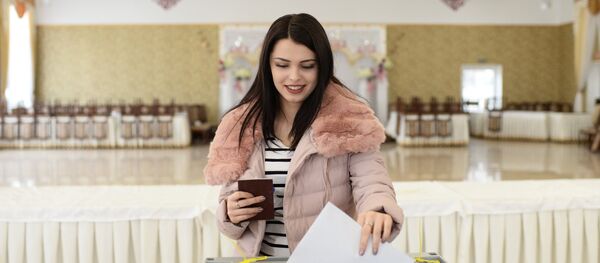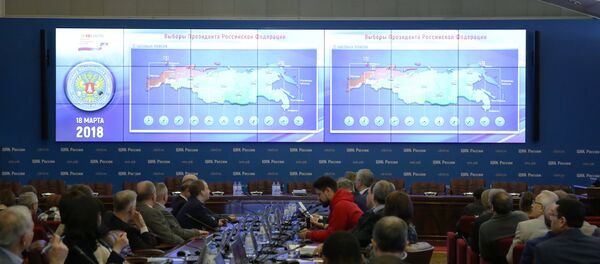The election campaign began on December 18. The federal budget allocated 17.697 billion rubles ($307.8 million) to organize the vote.
A total of eight candidates are running for president this year, namely: Sergey Baburin from the All-People's Union party, Communist Party candidate Pavel Grudinin, incumbent Russian President Vladimir Putin, Civil Initiative party candidate Ksenia Sobchak, Communists of Russia party chairman Maxim Suraykin, Presidential Commissioner for Entrepreneurs’ Rights Boris Titov, co-founder of the Yabloko party Grigory Yavlinsky, and head of the Liberal Democratic Party of Russia Vladimir Zhirinovsky.
No Phantom Voters
The number of eligible voters in Russia equals 108.9 million people as of January 1, 2018, while abroad the number exceeds 1.87 million people.
Ahead of the election, the Russian Central Election Commission (CEC) has carefully checked the number of voters in order to cleanse the voter lists of phantom voters and repeated mentioning of voters. It also cooperated with the Russian Interior Ministry to rule out the double reporting of those who permanently reside abroad being registered in Russia.
The CEC this year simplified the previously complicated process of voting at the place of one's factual residence. The residents of Moscow who decided to cast their ballots for a presidential candidate and vote on the address of permanent residence registration may choose the most convenient polling station among 3,605 ones, only taking their passports with.
Full Readiness
According to Ella Pamfilova, the CEC chairwoman, the Russian election system is completely ready to hold the presidential election.
The polling places are predominantly organized in the educational facilities. They are also located at military units, on ships that will be away in at sea on the voting day, polar stations, airports, detention facilities and health resorts.
Technologies in the Election Process
Video surveillance cameras will be installed at the polling stations where some 80 percent of voters will take part in the election. Besides, the cameras will be for the first time ever installed at the territorial election commissions where voting results protocols will be delivered from district election commissions.
The number of ballot paper processing systems has been doubled to almost 13,000 for the Sunday election, plus there will be about 1,000 touch-screen voting systems, which brings the total to some 13,600. About one third of the voters will be able to use these electronic voting systems.
QR-codes will be used at the upcoming election to count voting results for the first time. This should reduce the number of mistakes due to human error and also accelerate the feeding of protocol data into the State Automated System Vybory. The CEC hopes that the use of QR-code technology will allow the cast ballots to be counted in record time.
International Observers
More than 1,500 foreign observers have been accredited to monitor the Russian presidential election, which will be comprised of diplomats and parliamentarians, among others.
The first international observers started their activities in the country in February. This group of 60 long-term observers from the OSCE Office for Democratic Institutions and Human Rights (ODIHR) has been deployed in 30 regions, including in such cities as Moscow, St. Petersburg, Pskov, Ryazan, Yaroslavl, Yekaterinburg, Chelyabinsk, Voronezh, Nizhny Novgorod, Kazan, and Vladivostok. Another 420 short-term observers will be deployed across Russia (excluding Crimea) immediately prior to the Sunday election.
There will be also public observers, including from the Civic Chamber of Russia, which has received the right to send observers to the voting stations.
Informing, Coverage of Election
The CEC launched a large-scale campaign to inform about the election and introduced new opportunities for voters to cast their ballots.
According to the CEC, almost 13,000 journalists from over 2,400 media outlets will observe the Russian presidential election. The total number includes 5,560 reporters from TV channels, and 117 journalists from Internet media. A total of 367 reporters from 80 foreign media will also be following the election.





